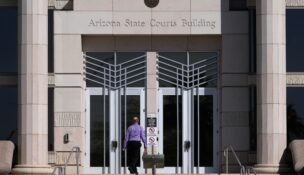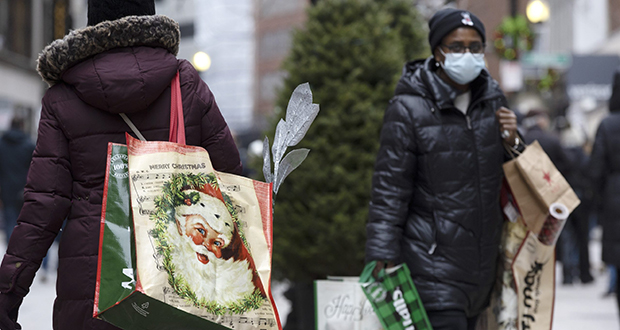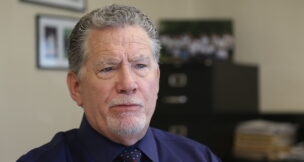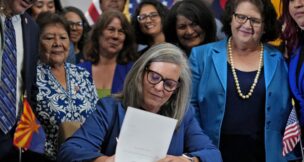Local and federal jurisdiction on a collision course in Pima County
Kiera Riley Arizona Capitol Times//August 23, 2025//
Local and federal jurisdiction on a collision course in Pima County
Kiera Riley Arizona Capitol Times//August 23, 2025//
Key Points:
-
Pima County and federal prosecutors clash over access to murder suspect
-
County attorney claims state case in jeopardy without federal collaboration
-
Legal experts note growing tension between immigration and criminal law
A power struggle between Pima County and federal prosecutorial agencies over access to a criminal defendant in the country illegally escalated to federal court this week, leaving distinct tension at the intersection of immigration and criminal law, and local and federal jurisdiction.
Julio Aguirre, 42, faces two sets of charges in both federal and state court for a carjacking and first degree murder in Tucson, but county prosecutors have so far been unable to locate or access the defendant for necessary court hearings after he was taken from a hospital by federal law enforcement after his arrest.
Pima County Attorney Laura Conover marked it as a distinct departure from a previously collaborative relationship between her office and federal law enforcement partners and a major wrench in the county’s criminal case, especially as the office goes beyond federal charges on behalf of the six people held at gunpoint.
“We can’t understand why the answer is no,” Conover said. “For the first time — on this case — in decades of collaboration, we just don’t understand it. And so now we’re going to ask a federal judge to help us all understand how we can just get to a just outcome here for all victims, and not just one.”
On June 30, Aguirre went on what the county attorney described in federal court as a “one man crime spree.” He first broke into a couple’s home and brandished a gun. Then, he fled.
About 15 minutes later, he held another man, Ricky Miller Sr., at gunpoint in an attempt to take his truck. Aguirre then shot the man, and the victim later died from his injuries.
As he fled, Aguirre pointed a gun at a witness. After another half hour, Aguirre burglarized another home and held three more people at gunpoint. He was later apprehended by police and transported to the hospital.
A state grand jury indicted Aguirre on 12 felony counts — one count of first degree murder, one attempt to commit armed robbery, six counts of aggravated assault with a deadly weapon, two for first degree burglary, one for possession of a deadly weapon by an undocumented alien and one possession of a deadly weapon by a convicted felon.
Meanwhile, the federal government secured an indictment with five felony counts — one for carjacking, one for the use and discharge of a firearm that resulted in a victim’s death, constituting first degree murder, one of illegal alien in possession of a firearm, illegal reentry of a removed alien and felon in possession of firearm in and affecting interstate commerce.
According to the Pima County Attorneys Office, the U.S. Attorney’s Office originally planned to have the Tucson Police Department book the suspect into Pima County Jail following medical release. Then, there was talk of federal custody, though with county access and transportation of Aguirre to aid the state prosecution.
But then, federal agents transported the suspect to a federal detention center without notice or information on where Aguirre would be and have since denied the County Attorney’s Office access to the defendant, despite initially agreeing to produce him for an initial appearance.
Conover said the current posture of the United States is a distinct departure from prior work. She pointed to the state and federal case against Samuel Lopez-Ozuna, a man charged with smuggling seven noncitizens and attempting to flee border patrol, resulting in a vehicle rollover that killed one of the passengers.
In Lopez-Ozuna’s case, the United States produced the defendant without question.
Now, according to an email from Christopher Brown, the chief assistant United States attorney, the office “decided it is not in the interests of justice to turn over Aguirre to the County on a writ for an initial appearance, or for any other parallel proceedings in state court.”
In another email, Raquel Arellano, assistant U.S. attorney and section chief of the Violent Crimes Unit, cited “significant federal interest in this case due to Aguirre being in the country illegally and having been previously removed from the United States.”
Before his most recent slate of charges, Aguirre was charged ten times between 2007 and 2013 for immigration related crimes and was removed from the United States in 2013.
The immigration axis of the case continues to lead the conversation. U.S. District Attorney for Arizona Timothy Courchaine expressed the same in a prepared statement.
“The alleged series of crimes in the indictment, starting with illegal immigration, escalating to prohibited possession of a firearm, and culminating in the death of an innocent individual, is why the United States Attorney’s Office takes this matter so seriously,” Courchaine said.
For the county attorney’s part, Conover said the lack of access put the state’s case in jeopardy over the inability to take depositions of the victims and witnesses — two of whom are in their late 70s.
“The United States is aware of this. Its continued obstructionism therefore risks spoliating critical evidence without which Aguirre cannot be held fully accountable for his crimes,” the complaint read.
The conflict forays into the larger conversation over state and federal control, as well as the balance between immigration and criminal law.
“When the President and the Attorney General of the United States said that they need to go after those who are present illegally in the country and who have committed crimes, this is just not what anyone understood by that, that you would then deprive local crime victims of justice, that that would be the exchange. It’s just a truly kind of absurd outcome,” Conover said.
Angela Banks, a vice dean for the Sandra Day O’Connor College of Law and expert in immigration and citizenship law, said the scene playing out is resonant of a larger breakdown in cooperation between local law enforcement and immigration enforcement, especially as deportation rises in priority over the criminal process.
A spokesperson for the U.S. Attorney’s Office declined to say whether deportation was a potential route for Aguirre, but for now, he was charged by a federal grand jury and is currently in federal custody awaiting trial.
Banks noted the harm if the federal government does opt for removal before the full adjudication of his case.
“All the purposes and goals of criminal justice in our society are being put to the side,” Banks said. “Rather, that is about retribution, if it’s about ensuring that victims are able to have some closure on the fact that the people who victimize them are being addressed directly by the state. All of those justifications for punishment are left unsatisfied when you prioritize the deportation over the completion of the criminal justice process.”














































